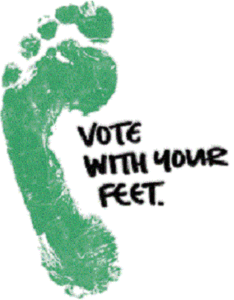The Volokh Conspiracy
Mostly law professors | Sometimes contrarian | Often libertarian | Always independent
My New Article on "How Judicial Review Can Help Empower People to Vote with Their Feet"
The article challenges longstanding conventional wisdom claiming that judicial review of democratically enacted laws is at odds with popular political choice.

I recently posted to SSRN a draft of my forthcoming article on "How Judicial Review can Help Empower People to Vote with their Feet." It is part of a symposium organized by the Institute for Justice on the topic of ""Does the Will of the People Exist?" The article is available here. Here is the abstract:
For decades, critics of judicial review have argued that it inhibits the will of the people, expressed through laws and regulations enacted by democratically elected officials. Thus, they argue, it should be used sparingly, or perhaps even not at all. This critique implicitly assumes that the political freedom of the people is best expressed through ballot box voting. We elect government officials, and thereby decide what government policies they wish to live under. Judicial review must therefore be kept within strict bounds, if not eliminated entirely, in order to avoid infringing on democratic self-government. This Article challenges that assumption and instead suggest that political choice is often best expressed through foot voting, rather than ballot-box voting. That, in turn, strengthens the case for strong judicial review in a range of areas.
People can vote with their feet through international migration, by choosing what jurisdiction to live in within a federal system, and by making decisions in the private sector. All three types can be enhanced by judicial review. Instead of a singular collective "will of the people," foot voting enables individual members of the public to pursue a wide range of policy preferences. As a result, it allows far more people to live under policies that they prefer, and reduces the disadvantages faced by minorities.
Part I of this Article summarizes the advantages of foot voting over ballot box voting as a mode of political choice. In particular, foot voting enables individuals to make decisions that are more likely to have a decisive impact in determining the policies they live and more likely to be well-informed. It also offers a wider range of choice to people with minority preferences. Part II provides a brief overview of the three types of foot voting. Part III explains how judicial review can empower foot voting within a federal system by enforcing structural constitutional limits on the scope of federal government power. Part IV describes how judicial review can enhance foot voting in both the public and private sector by enforcing individual rights that make foot voting more feasible and effective. Finally, Part V discusses how judicial review can enhance foot voting through international migration.
Foot voting is not the only factor that must be considered in determining the appropriate level of judicial review in a constitutional system. But it is a crucial issue that often gets overlooked in debates over the role of the judiciary in a democratic society.
This article builds on my previous work on political ignorance and the countermajoritarian difficulty, and also on parts of my book Free to Move: Foot Voting, Migration, and Political Freedom. There will likely be considerable revisions before the piece gets published. So I look forward to getting comments and from scholars and others.


Show Comments (1)